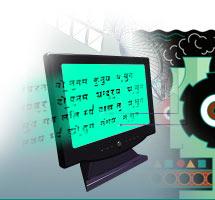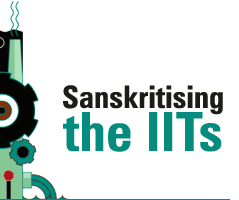Home > News > Specials
The Rediff Special/Priya Ganapati
March 09, 2004


Along with probability theory, calculus, courses in mechanical, chemical or civil engineering, students of the Indian Institute of Technology, Delhi, will soon have a new subject to pore over: Sanskrit.
For the last three years, IIT Delhi has been working on a plan to introduce two courses in Sanskrit for undergraduate students. These courses are expected to give the students a glimpse into the information contained in ancient Sanskrit texts.
The idea is to 'bring the students and teachers to the orders of thinking that are available in Sanskrit without any mediation by the contemporary demands of what constitutes an intellectual discourse'. In other words, the course aims at broadening students' thinking.
But the move is also the result of a nudge from Union Minister for Human Resources Development Murli Manohar Joshi.
In July 2000, the HRD ministry sent out notices to around 40 educational institutions, including the IITs and the Indian Institute of Science, asking them to consider the idea of introducing Sanskrit courses. Over the last three-and-a-half years, a group of nine IIT professors along with an advisory committee comprising Sanskrit experts drew up the curriculum for the courses.
"Modern scientific concepts are not more than 300 years old. Students must know what constituted science in India during the last 1,000 years. Today, science and technology are decided within the Western framework. It is important to know India's legacy in these subjects," says Wagesh Shukla, professor of mathematics at IIT Delhi and convener of the committee that decided the curriculum.
Ancient India has been credited with many discoveries in mathematics, astronomy, medicine and architecture and most of the discoveries in that age have been chronicled in Sanskrit.
Sanskrit, which developed in around 1500 BC, is regarded as the Asian equivalent of Latin because of its role in chronicling India's religious and historical literature. More Sanskrit documents are estimated to have been preserved than documents in Latin and Greek combined.
However, Sanskrit as a spoken language died out centuries ago; today, it is only spoken by scholars and others who have been trained in the language. As a result, the entire knowledge codified in the ancient texts has been lost as well, say the IIT Delhi professors.
"India's contribution to the field of science and technology has been noteworthy. Take, for instance, the concept of shunya [zero]. This has been chronicled in the Sanskrit texts but, because people do not know the language, there is no widespread access to the information," says Dr M Jagadesh Kumar, associate professor at the department of electrical engineering, IIT Delhi, who now heads the committee overseeing the introduction of the courses.
To re-introduce some of the ancient ideas to students, IIT Delhi has planned two courses: Building Science, which will deal with engineering knowledge drawn from the ancient texts, and Study of Scientific Systems in ancient India, which will present scientific ideas from Sanskrit texts.
"The basic idea is not as much to present specific examples from Sanskrit texts as to introduce students to what constituted the body of scientific work in ancient India. We are not looking in the text for examples of what we see today in modern science. We are looking for what functioned as science and how it was used," says Professor Shukla.
Students who opt for Study of Scientific Systems will learn what 'proof,' 'observation,' 'rule' and other scientific definitions meant to the thinkers of the past. They will also learn different kinds of logical reasoning systems with examples drawn from various Sanskrit texts.
The key text that will be taught will be the Astadhyayi, the grammar of Sanskrit. "It is responsible for modern linguistic sciences and is supposed to be the forerunner of artificial intelligence," says Professor Shukla.
IIT Delhi plans to prepare course material based on Sanskrit texts for use by students both in the IITs and in other colleges. It also plans to produce research monographs which "debate, employ or reject the practicality of the paradigms of investigation that are available in Sanskrit for taking up the problems of science and technology of the new century," says Professor Kumar.
The Sanskrit courses will, however, be taught in English, the medium of instruction at the IITs. But their introduction has been stymied for a while now due to the unavailability of qualified teachers.
Since IIT Delhi is keen on introducing its students to ideas drawn from ancient Sanskrit texts rather than teaching them the language, finding someone who fits the bill has been difficult.
"We are not just teaching the language, we are looking at the science and technology part of it. Most Sanskrit teachers are language experts. We need people who are conversant with both the language and the scientific knowledge written in the language. We want to expose students to both aspects," says Professor Kumar, who has volunteered to teach the courses till the Institute is able to find new teachers.
The Sanskrit courses will be offered as electives to students, which means they will retain the ultimate choice on whether they want to study it or not.
"Students already have a very heavy curriculum. We cannot add more courses. But we will offer these are electives so they can take it if they are interested," says Professor Kumar.
Every student in the undergraduate engineering course at IIT Delhi has to take at least one humanities course. Currently, students have subjects like psychology, literature, philosophy and sociology to choose from.
Most students are unaware of the plans to introduce Sanskrit courses.
"I haven't heard about this. But if we were given the option to take these courses, I don't see any problem. It certainly sounds interesting. After all, Sanskrit is something we all have heard about though we never got a chance to study it," says Kalpana Singh, an undergraduate student in textiles engineering and general secretary of the students.
Other students say a lot will depend on how the course is structured and marketed.
"It sounds interesting if the course talks of ancient scientific ideas and concepts. I feel it is better than studying sociology or psychology and would not mind taking it. It depends on how the course is presented. If it is about learning the language, I don't know if I will go for it, but if it is about ancient concepts, why not?" asks Vikas Mittal, a second year student of chemical engineering.
IIT Delhi says it did not plan to introduce these courses because of any pressure from the HRD ministry. Rather, it is an attempt to "expose students to the best of everything."
"Sanskrit texts contain a lot of information about India's contribution to science and technology. Sadly, our students are not aware of it. We do not see any so-called 'saffronisation' agenda in making our students aware of India's history and contributions to science and technology," says Professor Kumar.
Eventually, IIT Delhi plans to integrate the Sanskrit courses into its system of teaching -- rather than just offering it as an elective -- and start awarding degree programmes in the subject. Almost all the material prepared will be put in a downloadable form on the IIT website. Instructional CDs and DVDs will also be created.
"Such a course could add value to the students. We would probably take more interest in engineering if we know how old some concepts in it are and how it has helped our civilization in the past," says Mittal.
Image: Uday Kuckian